Tia Silverthorne Bach's Blog, page 57
April 30, 2013
Zani = Z: Blogging from A to Z
Congratulations to all the participants of the Blogging from A to Z Challenge who are finishing out the month today with Z.
 Source
Source
I can't wait to visit other blogs today--Z isn't the easiest letter.
My theme this month has been literary devices. I have learned so much! Z was hard, but I found...
Zani
A stock character in the commedia dell'arte , the zani was a buffoonish servant, a jester, a butt of jokes, i.e., what twentieth-century entertainment would call a "stooge." The modern English word zany comes from this Italian term. (source)
Most stories benefit from a character who serves as comic relief. Often, we'll explain a great read as, "I laughed, I cried." It's the salty and sweet effect--balancing emotional moments with a good laugh.
The first example that popped in my head... Dory. She helped Marlin find his son, Nemo, but she was also the jester--constantly cracking jokes and being silly.
In literature, Shakespeare often featured a "buffoonish servant" or jester. For example, in A Midsummer Night's Dream, there is a jester named Puck. He not only provides comic relief but also becomes a pivotal character who affects many others.
In addition to providing comic relief, the "fool" often becomes the main character's conscience. Think Dory again. What a valuable tool.
Can you think of an example of zani?
Thanks to everyone who visited my blog this month. I hope you'll continue to visit.
Don't forget to visit other Z blogs today-- find A to Z participants here .
 Source
SourceI can't wait to visit other blogs today--Z isn't the easiest letter.
My theme this month has been literary devices. I have learned so much! Z was hard, but I found...
Zani
A stock character in the commedia dell'arte , the zani was a buffoonish servant, a jester, a butt of jokes, i.e., what twentieth-century entertainment would call a "stooge." The modern English word zany comes from this Italian term. (source)
Most stories benefit from a character who serves as comic relief. Often, we'll explain a great read as, "I laughed, I cried." It's the salty and sweet effect--balancing emotional moments with a good laugh.
The first example that popped in my head... Dory. She helped Marlin find his son, Nemo, but she was also the jester--constantly cracking jokes and being silly.
In literature, Shakespeare often featured a "buffoonish servant" or jester. For example, in A Midsummer Night's Dream, there is a jester named Puck. He not only provides comic relief but also becomes a pivotal character who affects many others.
In addition to providing comic relief, the "fool" often becomes the main character's conscience. Think Dory again. What a valuable tool.
Can you think of an example of zani?
Thanks to everyone who visited my blog this month. I hope you'll continue to visit.
Don't forget to visit other Z blogs today-- find A to Z participants here .
Published on April 30, 2013 16:26
April 29, 2013
Yarn = Y: Blogging from A to Z
Only two more days left in the Blogging from A to Z Challenge.
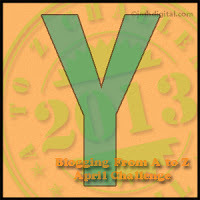 Of course those two days are Y and Z. No small challenge, especially for my theme--exploring literary devices.
Of course those two days are Y and Z. No small challenge, especially for my theme--exploring literary devices.
Today's Y...
YarnAn informal name for a long, rambling story--especially one dealing with adventure or tall-tales. The genre typically involves a strong narrative presence and colloquial or idiomatic English. The tone is realistic, but the content is typically fantastic or hyperbolic. ( source )
Often, you hear this as "spin a yarn." When I think of a yarn, I think of a good campfire story. One told with lots of inflection late at night with the eerie glow of a campfire. The better the storyteller, the better the story.
By definition above, it's all about adventure and tall-tales. Makes sense, because those are the ones that I almost hear in my head. Since my kids and I recently watched the movie, Inkheart came to mind. It's about a man who brings stories to life when he reads them out loud.
Wow, what an amazing gift. But isn't that what any good storyteller does? Storytellers can make or break an audio book, no matter how poor/great the material.
What was the last book you read that you wished a great storyteller was reading out loud to you? Or, what was the last audio book you listened to where the reader made it come to life?
Check out the other Ys here .
 Of course those two days are Y and Z. No small challenge, especially for my theme--exploring literary devices.
Of course those two days are Y and Z. No small challenge, especially for my theme--exploring literary devices.Today's Y...
YarnAn informal name for a long, rambling story--especially one dealing with adventure or tall-tales. The genre typically involves a strong narrative presence and colloquial or idiomatic English. The tone is realistic, but the content is typically fantastic or hyperbolic. ( source )
Often, you hear this as "spin a yarn." When I think of a yarn, I think of a good campfire story. One told with lots of inflection late at night with the eerie glow of a campfire. The better the storyteller, the better the story.
By definition above, it's all about adventure and tall-tales. Makes sense, because those are the ones that I almost hear in my head. Since my kids and I recently watched the movie, Inkheart came to mind. It's about a man who brings stories to life when he reads them out loud.
Wow, what an amazing gift. But isn't that what any good storyteller does? Storytellers can make or break an audio book, no matter how poor/great the material.
What was the last book you read that you wished a great storyteller was reading out loud to you? Or, what was the last audio book you listened to where the reader made it come to life?
Check out the other Ys here .
Published on April 29, 2013 04:00
April 28, 2013
Quick Update & a Question = ROW80 Update
It's 11pm on Sunday, and I'm finally sitting down to write a ROW80 update.
It seems I only know how to publish a book in the middle of a huge move. Depression Cookies came out September 27, 2010, right in the middle of our move from Colorado to Maryland. We moved into our new home November 11, 2010.
So, of course, I'm about to hit publish on my first YA book, Chasing Memories, while in the middle of a Maryland to California move. My husband has been there since March 11, and the girls and I are staying in Maryland until school ends (6/15).
I realize there is no perfect time to publish, but really!!
Okay, enough of my whining, because I'm so happy about Chasing Memories. My plan is to set up a cover reveal tour followed by a release day blitz. My proof is ordered and on its way. *biting nails*
Later this week, I'll have a post begging asking my blogger friends to participate in the cover reveal and release day blitz. So excited!
 SourceI'd update my goals, but pretty much the last week has been spent on CreateSpace and last minute publishing needs (like ordering the proofs).
SourceI'd update my goals, but pretty much the last week has been spent on CreateSpace and last minute publishing needs (like ordering the proofs).
I plan to host several giveaways... this is where I can use your help. Have you participated in giveaways? What giveaway items did you find most successful? (Is a $20 Amazon gift card better than a signed paperback?)
Hope all my ROW80 friends are having a great week!
It seems I only know how to publish a book in the middle of a huge move. Depression Cookies came out September 27, 2010, right in the middle of our move from Colorado to Maryland. We moved into our new home November 11, 2010.
So, of course, I'm about to hit publish on my first YA book, Chasing Memories, while in the middle of a Maryland to California move. My husband has been there since March 11, and the girls and I are staying in Maryland until school ends (6/15).
I realize there is no perfect time to publish, but really!!
Okay, enough of my whining, because I'm so happy about Chasing Memories. My plan is to set up a cover reveal tour followed by a release day blitz. My proof is ordered and on its way. *biting nails*
Later this week, I'll have a post begging asking my blogger friends to participate in the cover reveal and release day blitz. So excited!
 SourceI'd update my goals, but pretty much the last week has been spent on CreateSpace and last minute publishing needs (like ordering the proofs).
SourceI'd update my goals, but pretty much the last week has been spent on CreateSpace and last minute publishing needs (like ordering the proofs).I plan to host several giveaways... this is where I can use your help. Have you participated in giveaways? What giveaway items did you find most successful? (Is a $20 Amazon gift card better than a signed paperback?)
Hope all my ROW80 friends are having a great week!
Published on April 28, 2013 20:27
April 27, 2013
Xanaduism = X: Blogging from A to Z
One of the hardest days of the Blogging from A to Z Challenge.
Parents can identify with the difficulty of this letter. Think about all the ABC books your kids read growing up--X was either X-ray or Xylophone. That's it.
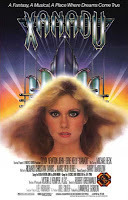 SourceBut I had to come up with an X literary device.
SourceBut I had to come up with an X literary device.
What would I do without the Internet?
(For my friends from the 80s, this is not a post about the Olivia Newton-John film featured in the photo.)
Xanaduism
Academic research that focuses on the sources behind imaginative works of literature and fantasy. John Livingstone Lowes, in his publication The Road to Xanadu (1927), inspired the name, which in turn goes back to Coleridge's visionary poem "Kubla Khan" (i.e., "In Xanadu did Kubla Khan a stately pleasure dome decree . . ."). More recently, the term has been used in a pejorative sense to describe scholarship involving dubious scrutiny of amorphous, difficult-to-prove sources, especially simplistic studies lacking any redeeming theoretical perspectives. (source)
First, kudos to all my fellow word nerds for understanding the last sentence of that definition!
Most of the searches I did on this topic were a dead end. Even when I looked into The Road to Xanadu, I was met with very ambiguous descriptions. From what I could gather, John Livingstone Lowes was the type of reader that would read a work, then read the works referenced in that work, and so on.
So instead of letting my head spin too much, I went in a different direction... how much fun it would be to research the thought process behind the Lord of the Rings trilogy? Research is one thing. Even better... how cool would it be to sit down with J. R. R. Tolkien and ask how he came up with Middle Earth?
I'd love to know what came to him first and how it progressed from there.
What author's brain, either living or dead, would you like to pick?
Find some more X posts here .
Parents can identify with the difficulty of this letter. Think about all the ABC books your kids read growing up--X was either X-ray or Xylophone. That's it.
 SourceBut I had to come up with an X literary device.
SourceBut I had to come up with an X literary device.What would I do without the Internet?
(For my friends from the 80s, this is not a post about the Olivia Newton-John film featured in the photo.)
Xanaduism
Academic research that focuses on the sources behind imaginative works of literature and fantasy. John Livingstone Lowes, in his publication The Road to Xanadu (1927), inspired the name, which in turn goes back to Coleridge's visionary poem "Kubla Khan" (i.e., "In Xanadu did Kubla Khan a stately pleasure dome decree . . ."). More recently, the term has been used in a pejorative sense to describe scholarship involving dubious scrutiny of amorphous, difficult-to-prove sources, especially simplistic studies lacking any redeeming theoretical perspectives. (source)
First, kudos to all my fellow word nerds for understanding the last sentence of that definition!
Most of the searches I did on this topic were a dead end. Even when I looked into The Road to Xanadu, I was met with very ambiguous descriptions. From what I could gather, John Livingstone Lowes was the type of reader that would read a work, then read the works referenced in that work, and so on.
So instead of letting my head spin too much, I went in a different direction... how much fun it would be to research the thought process behind the Lord of the Rings trilogy? Research is one thing. Even better... how cool would it be to sit down with J. R. R. Tolkien and ask how he came up with Middle Earth?
I'd love to know what came to him first and how it progressed from there.
What author's brain, either living or dead, would you like to pick?
Find some more X posts here .
Published on April 27, 2013 04:00
April 26, 2013
Wish Fulfillment = W: Blogging from A to Z
Only 4 more days to go in the Blogging from A to Z Challenge!
W, X, Y and Z are left. Nothing like ending a blogging challenge with an uphill climb. Not the easiest of letters left to go.
 Source
Source
Continuing with my literary devices theme, today is all about Wish Fulfillment.
Wish Fulfillment
In psychoanalytic criticism, wish fulfillment refers to something in literature that satisfies the conscious or subconscious desires of either the creator or the reader of a work. A writer of action adventure stories, for instance, might imagine a male protagonist who is stronger, tougher, younger, and smarter than himself. This protagonist lives a sophisticated life of international intrigue; he woos exotic women and foils evil plots, doing all the things the writer himself cannot do. Readers sharing similar conscious or unconscious fantasies may be attracted to such stories to fulfill their own desires vicariously. Nearly all popular literature has some element of wish fulfillment in it. (source)
Our earliest stories are often fairy tales. In these, the clear expectation is that the main character(s) will live happily ever after. Romance novels can take us out of our mundane day to day and deliver some steam, often delivering a knight in shining armor.
We are drawn to books for many reasons, but escape is usually at the top of the list. When we are looking for wish fulfillment or an escape, we don't tend to search for heavy material.
Freud, in his The Interpretation of Dreams, insists that dreams are the result of our wish fulfillment. So, in many ways, are our book choices.
I wonder sometimes why some people are so wrapped up in one genre, while I flit from one genre to the next. But then I thought about it. I tend to pick books and movies based on my mood at the time.
If I'm feeling overdone with life, I will pick something light or a romance. Simple escapism. Other times, I want to figure out why we women do what we do (I am the mom to three girls after all). So, it's on to women's fiction.
What book are you currently reading? Does it fulfill some need to escape?
And don't forget to check out the other Ws here .
W, X, Y and Z are left. Nothing like ending a blogging challenge with an uphill climb. Not the easiest of letters left to go.
 Source
SourceContinuing with my literary devices theme, today is all about Wish Fulfillment.
Wish Fulfillment
In psychoanalytic criticism, wish fulfillment refers to something in literature that satisfies the conscious or subconscious desires of either the creator or the reader of a work. A writer of action adventure stories, for instance, might imagine a male protagonist who is stronger, tougher, younger, and smarter than himself. This protagonist lives a sophisticated life of international intrigue; he woos exotic women and foils evil plots, doing all the things the writer himself cannot do. Readers sharing similar conscious or unconscious fantasies may be attracted to such stories to fulfill their own desires vicariously. Nearly all popular literature has some element of wish fulfillment in it. (source)
Our earliest stories are often fairy tales. In these, the clear expectation is that the main character(s) will live happily ever after. Romance novels can take us out of our mundane day to day and deliver some steam, often delivering a knight in shining armor.
We are drawn to books for many reasons, but escape is usually at the top of the list. When we are looking for wish fulfillment or an escape, we don't tend to search for heavy material.
Freud, in his The Interpretation of Dreams, insists that dreams are the result of our wish fulfillment. So, in many ways, are our book choices.
I wonder sometimes why some people are so wrapped up in one genre, while I flit from one genre to the next. But then I thought about it. I tend to pick books and movies based on my mood at the time.
If I'm feeling overdone with life, I will pick something light or a romance. Simple escapism. Other times, I want to figure out why we women do what we do (I am the mom to three girls after all). So, it's on to women's fiction.
What book are you currently reading? Does it fulfill some need to escape?
And don't forget to check out the other Ws here .
Published on April 26, 2013 04:00
April 25, 2013
Veracious Verisimilitude = V: Blogging from A to Z
I love V!
Valentine's Day, Veracity, Voluptuous, Vexatious, Victorious, Virtuous, Vicious, Villain. A word nerd's dream.
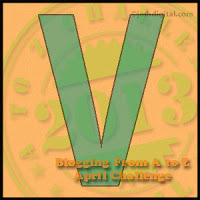
But a V literary device?
Took a little research, but I found...
Verisimilitude
The sense that what one reads is "real," or at least realistic and believable. For instance, the reader possesses a sense of verisimilitude when reading a story in which a character cuts his finger, and the finger bleeds. If the character's cut finger had produced sparks of fire rather than blood, the story would not possess verisimilitude. Note that even fantasy novels and science fiction stories that discuss impossible events can have verisimilitude if the reader is able to read them with suspended disbelief. (source)
Verisimilitude is one of the things that makes a good book great. A book is an author's attempt to define truth to the reader. Truth, unlike facts, is in the eye of the beholder. With enough convincing, something that is factually inaccurate can become our truth.
Since a work of fiction is by definition invented in an author's imagination, verisimilitude becomes the ability to create a believable storyline. When doubt creeps in, the "made up" aspects of fiction take root and the reader disengages. Never good.
From my research on the word, the responsibility for verisimilitude use to lie with the audience--what they could accept as truth. Now it seems to refer more to the creator--what they can portray as truth.
Where it's tricky... fantasy and paranormal. An author in these genres must convince the reader that something that is obviously not real (e.g., Narnia) is very real.
What will make you doubt a novel's verisimilitude the quickest? For me, it's when a character I care about suddenly does something completely out of left field. It makes me doubt everything in the book--everything I thought I knew.
Check out some great V posts here .
Valentine's Day, Veracity, Voluptuous, Vexatious, Victorious, Virtuous, Vicious, Villain. A word nerd's dream.

But a V literary device?
Took a little research, but I found...
Verisimilitude
The sense that what one reads is "real," or at least realistic and believable. For instance, the reader possesses a sense of verisimilitude when reading a story in which a character cuts his finger, and the finger bleeds. If the character's cut finger had produced sparks of fire rather than blood, the story would not possess verisimilitude. Note that even fantasy novels and science fiction stories that discuss impossible events can have verisimilitude if the reader is able to read them with suspended disbelief. (source)
Verisimilitude is one of the things that makes a good book great. A book is an author's attempt to define truth to the reader. Truth, unlike facts, is in the eye of the beholder. With enough convincing, something that is factually inaccurate can become our truth.
Since a work of fiction is by definition invented in an author's imagination, verisimilitude becomes the ability to create a believable storyline. When doubt creeps in, the "made up" aspects of fiction take root and the reader disengages. Never good.
From my research on the word, the responsibility for verisimilitude use to lie with the audience--what they could accept as truth. Now it seems to refer more to the creator--what they can portray as truth.
Where it's tricky... fantasy and paranormal. An author in these genres must convince the reader that something that is obviously not real (e.g., Narnia) is very real.
What will make you doubt a novel's verisimilitude the quickest? For me, it's when a character I care about suddenly does something completely out of left field. It makes me doubt everything in the book--everything I thought I knew.
Check out some great V posts here .
Published on April 25, 2013 04:00
April 24, 2013
Unreliable Narrator = U: Blogging from A to Z
Only six more days to go in the Blogging from A to Z Challenge.
And now we are up to U.
I knew as soon as I did N = Noteworthy Narrators what U would be.
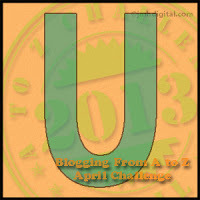 Unreliable Narrator
Unreliable Narrator
An unreliable narrator is a storyteller who "misses the point" of the events or things he describes in a story, who plainly misinterprets the motives or actions of characters, or who fails to see the connections between events in the story. The author herself, of course, must plainly understand the connections, because she presents the material to the readers in such a way that readers can see what the narrator overlooks. This device is sometimes used for purposes of irony or humor. ( source )
Using the same example I used for plot twists , Fight Club features an unreliable narrator. An unnamed narrator (Edward Norton's character in the movie) doesn't even realize he's unreliable, so the audience has no cause to believe he is either. In this case, it was used for dramatic effect and led the reader directly to an amazing plot twist. No irony or humor there.
Then consider The Exorcist. Is the narrator Regan, or the demon who possesses her? To assume the demon, you have to embrace the idea that Regan is lost to the demon. And if it is the demon, can he even be reliable?
If any narrator is delusional or mental, can we possibly trust their interpretation of events?
The key for the reader is if they understand the narrator is unreliable. Most often, an author chooses this device to lure the reader to a certain conclusion and have them wonder about it.
More U fun can be found at blogs listed here .
And now we are up to U.
I knew as soon as I did N = Noteworthy Narrators what U would be.
 Unreliable Narrator
Unreliable NarratorAn unreliable narrator is a storyteller who "misses the point" of the events or things he describes in a story, who plainly misinterprets the motives or actions of characters, or who fails to see the connections between events in the story. The author herself, of course, must plainly understand the connections, because she presents the material to the readers in such a way that readers can see what the narrator overlooks. This device is sometimes used for purposes of irony or humor. ( source )
Using the same example I used for plot twists , Fight Club features an unreliable narrator. An unnamed narrator (Edward Norton's character in the movie) doesn't even realize he's unreliable, so the audience has no cause to believe he is either. In this case, it was used for dramatic effect and led the reader directly to an amazing plot twist. No irony or humor there.
Then consider The Exorcist. Is the narrator Regan, or the demon who possesses her? To assume the demon, you have to embrace the idea that Regan is lost to the demon. And if it is the demon, can he even be reliable?
If any narrator is delusional or mental, can we possibly trust their interpretation of events?
The key for the reader is if they understand the narrator is unreliable. Most often, an author chooses this device to lure the reader to a certain conclusion and have them wonder about it.
More U fun can be found at blogs listed here .
Published on April 24, 2013 04:00
April 23, 2013
Tabula Rasa = T: Blogging from A to Z
Time for T!
When pondering T literary devices, the first one that popped in my head was theme. But I really wanted this month to be about avoiding the obvious choices.
So when I happened upon tabula rasa, I was intrigued.
 Source
Tabula Rasa
Source
Tabula Rasa
Latin, "erased tablet": The term used in Enlightenment philosophy for the idea that humanity is born completely innocent, without any initial predispositions, attitudes, or beliefs. Accordingly, no natural state of humanity exists, but instead, humanity is infinitely malleable. The newborn child is thus a "blank slate" on which experiences and education will write his or her future personality and beliefs. The idea is influential in the philosophical writings of Locke, Rousseau, and Wollstonecraft, but it also influences literary fiction such as Frankenstein, in which the monster's account of his experiences after his initial creation characterize him as an innocent tabula rasa. ( source )
After reading this, I had two immediate thoughts.
One, as a writer, we create characters from a blank slate. We give them experiences and backgrounds to help form who we want them to be. Every character we create is our own form of Frankenstein. No matter what type of character, we start with a blank piece of paper--or tabula rasa--and mold personality, life experience, and other factors into a character readers can care about.
Second, although I agree that humanity is born innocent, I do not believe newborns are blank slates. As the mother of three children, I was amazed at how much of their personality I saw in the newborn phase: easily frustrated, happy go lucky, temperamental, and so on. Right from the womb! The same two people are raising three kids, and yet they couldn't be more different if they tried. Same parents, same socioeconomic status, same teachings. Different kids.
But since philosophers were mentioned, I had a deep thought (when I have them, by God I'm sharing them! *winks*)... can even our characters be blank slates? They are, after all, influenced by us. Hmmmm.
Check out some awesome T thoughts by visiting the Blogging from A to Z participant list .
When pondering T literary devices, the first one that popped in my head was theme. But I really wanted this month to be about avoiding the obvious choices.
So when I happened upon tabula rasa, I was intrigued.
 Source
Tabula Rasa
Source
Tabula Rasa
Latin, "erased tablet": The term used in Enlightenment philosophy for the idea that humanity is born completely innocent, without any initial predispositions, attitudes, or beliefs. Accordingly, no natural state of humanity exists, but instead, humanity is infinitely malleable. The newborn child is thus a "blank slate" on which experiences and education will write his or her future personality and beliefs. The idea is influential in the philosophical writings of Locke, Rousseau, and Wollstonecraft, but it also influences literary fiction such as Frankenstein, in which the monster's account of his experiences after his initial creation characterize him as an innocent tabula rasa. ( source )
After reading this, I had two immediate thoughts.
One, as a writer, we create characters from a blank slate. We give them experiences and backgrounds to help form who we want them to be. Every character we create is our own form of Frankenstein. No matter what type of character, we start with a blank piece of paper--or tabula rasa--and mold personality, life experience, and other factors into a character readers can care about.
Second, although I agree that humanity is born innocent, I do not believe newborns are blank slates. As the mother of three children, I was amazed at how much of their personality I saw in the newborn phase: easily frustrated, happy go lucky, temperamental, and so on. Right from the womb! The same two people are raising three kids, and yet they couldn't be more different if they tried. Same parents, same socioeconomic status, same teachings. Different kids.
But since philosophers were mentioned, I had a deep thought (when I have them, by God I'm sharing them! *winks*)... can even our characters be blank slates? They are, after all, influenced by us. Hmmmm.
Check out some awesome T thoughts by visiting the Blogging from A to Z participant list .
Published on April 23, 2013 04:00
April 22, 2013
Scrumptious Setting = S: Blogging from A to Z
Happy Monday!
It's time for S in the Blogging from A to Z Challenge. Scintillating, isn't it?
Today, keeping with my literary devices theme, I wanted to talk about setting.
Setting
(source)
in literature, the location and time frame in which the action of a narrative takes place
Seems simple, right?
Consider a twelve-year-old girl as a main character. Of course we want to know what she looks like, what her home life is like. Let's say she's a brunette with dark brown eyes and fair skin.
Now, put her in Hollywood in the 80s. How about Germany in 1944? Totally different vibe, but both add details for who our character will be.
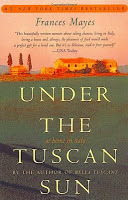 Sometimes the setting becomes another character in the book. In Under the Tuscan Sun, Italy is a vital component to the story. The book's description (from Amazon):
Sometimes the setting becomes another character in the book. In Under the Tuscan Sun, Italy is a vital component to the story. The book's description (from Amazon):
Frances Mayes—widely published poet, gourmet cook, and travel writer—opens the door to a wondrous new world when she buys and restores an abandoned villa in the spectacular Tuscan countryside. In evocative language, she brings the reader along as she discovers the beauty and simplicity of life in Italy. Mayes also creates dozens of delicious seasonal recipes from her traditional kitchen and simple garden, all of which she includes in the book. Doing for Tuscany what M.F.K. Fisher and Peter Mayle did for Provence, Mayes writes about the tastes and pleasures of a foreign country with gusto and passion.
In a true testament to the setting's importance, the cover doesn't feature a character.
Setting can be an actual place or something completely dreamed up by the author. In Hunger Games, Suzanne Collins created District 12. The poverty-stricken, post-disaster area is a key element to the story of Katniss Everdeen. District 12 and The Capitol are a juxtaposition of poverty and opulence. Then, of course, there was the arena where the games were fought. Vivid setting details added to the complexity of the story.
What's your favorite setting in a novel?
Hope you are loving A to Z this year. Check out some amazing participants here .
Show more Show less
It's time for S in the Blogging from A to Z Challenge. Scintillating, isn't it?
Today, keeping with my literary devices theme, I wanted to talk about setting.
Setting
(source)
in literature, the location and time frame in which the action of a narrative takes place
Seems simple, right?
Consider a twelve-year-old girl as a main character. Of course we want to know what she looks like, what her home life is like. Let's say she's a brunette with dark brown eyes and fair skin.
Now, put her in Hollywood in the 80s. How about Germany in 1944? Totally different vibe, but both add details for who our character will be.
 Sometimes the setting becomes another character in the book. In Under the Tuscan Sun, Italy is a vital component to the story. The book's description (from Amazon):
Sometimes the setting becomes another character in the book. In Under the Tuscan Sun, Italy is a vital component to the story. The book's description (from Amazon):Frances Mayes—widely published poet, gourmet cook, and travel writer—opens the door to a wondrous new world when she buys and restores an abandoned villa in the spectacular Tuscan countryside. In evocative language, she brings the reader along as she discovers the beauty and simplicity of life in Italy. Mayes also creates dozens of delicious seasonal recipes from her traditional kitchen and simple garden, all of which she includes in the book. Doing for Tuscany what M.F.K. Fisher and Peter Mayle did for Provence, Mayes writes about the tastes and pleasures of a foreign country with gusto and passion.
In a true testament to the setting's importance, the cover doesn't feature a character.
Setting can be an actual place or something completely dreamed up by the author. In Hunger Games, Suzanne Collins created District 12. The poverty-stricken, post-disaster area is a key element to the story of Katniss Everdeen. District 12 and The Capitol are a juxtaposition of poverty and opulence. Then, of course, there was the arena where the games were fought. Vivid setting details added to the complexity of the story.
What's your favorite setting in a novel?
Hope you are loving A to Z this year. Check out some amazing participants here .
Show more Show less
Published on April 22, 2013 04:00
April 21, 2013
Whirlwind of Life Events: ROW80 Update
This week has been a whirlwind.
In the last week, I have* Visited San Francisco, soon to be my new home, for the first time ever.* Received the last edits on Chasing Memories.* Reviewed the interior of Chasing Memories.
 Today -- Fisherman's Wharf, San FranciscoStill in California looking for houses and getting acquainted with the area, I am knee-deep in final edits. I've also written my Acknowledgements section, agonized over my back cover summary, and created an About the Author. Okay, I agonized over all of them. I find the book easier to write! Please tell me I'm not the only one who struggles with these.
Today -- Fisherman's Wharf, San FranciscoStill in California looking for houses and getting acquainted with the area, I am knee-deep in final edits. I've also written my Acknowledgements section, agonized over my back cover summary, and created an About the Author. Okay, I agonized over all of them. I find the book easier to write! Please tell me I'm not the only one who struggles with these.
I. Am. Exhausted. But excited.
I can't wait to share my cover and some excerpts with everyone soon. But for now...
My Updated A Round of Words in 80 Days (ROW80) GoalsPublish Chasing Memories -- Working on last read-through. Will be done tomorrow. Excited, but nervous. It's almost time to publish. Eek!Survive the A to Z Blog Challenge -- Only done through T, so I plan to get through at least W tomorrow.Map out the sequel to Chasing Memories -- Too busy this week. Can't wait to get back to this.Make significant progress on the follow-up to Depression Cookies -- DCII is on hold right now for many reasons. I am not ready to walk away from this character, but my life is overflowing.Hope all my ROW80 buddies are rocking their goals! Check them out here .
A special note: Lauralynn Elliott, a long time ROW80 sponsor and participant, has been having a rough time. After some scary medical issues, Lauralynn's husband is back on the mend. But there are still financial concerns to contend with. Find out ways you can help a fellow writer here.
In the last week, I have* Visited San Francisco, soon to be my new home, for the first time ever.* Received the last edits on Chasing Memories.* Reviewed the interior of Chasing Memories.
 Today -- Fisherman's Wharf, San FranciscoStill in California looking for houses and getting acquainted with the area, I am knee-deep in final edits. I've also written my Acknowledgements section, agonized over my back cover summary, and created an About the Author. Okay, I agonized over all of them. I find the book easier to write! Please tell me I'm not the only one who struggles with these.
Today -- Fisherman's Wharf, San FranciscoStill in California looking for houses and getting acquainted with the area, I am knee-deep in final edits. I've also written my Acknowledgements section, agonized over my back cover summary, and created an About the Author. Okay, I agonized over all of them. I find the book easier to write! Please tell me I'm not the only one who struggles with these.
I. Am. Exhausted. But excited.
I can't wait to share my cover and some excerpts with everyone soon. But for now...
My Updated A Round of Words in 80 Days (ROW80) GoalsPublish Chasing Memories -- Working on last read-through. Will be done tomorrow. Excited, but nervous. It's almost time to publish. Eek!Survive the A to Z Blog Challenge -- Only done through T, so I plan to get through at least W tomorrow.Map out the sequel to Chasing Memories -- Too busy this week. Can't wait to get back to this.Make significant progress on the follow-up to Depression Cookies -- DCII is on hold right now for many reasons. I am not ready to walk away from this character, but my life is overflowing.Hope all my ROW80 buddies are rocking their goals! Check them out here .
A special note: Lauralynn Elliott, a long time ROW80 sponsor and participant, has been having a rough time. After some scary medical issues, Lauralynn's husband is back on the mend. But there are still financial concerns to contend with. Find out ways you can help a fellow writer here.
Published on April 21, 2013 20:15



